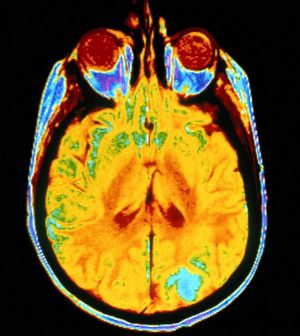- Could Your Grocery Store Meat Be Causing Recurring UTIs?
- Are You Making This Expensive Thermostat Error This Winter?
- Recognizing the Signs of Hypothyroidism
- 10 Strategies to Overcome Insomnia
- Could Artificial Sweeteners Be Aging the Brain Faster?
- Techniques for Soothing Your Nervous System
- Does the Water in Your House Smell Funny? Here’s Why
- Can a Daily Dose of Apple Cider Vinegar Actually Aid Weight Loss?
- 6 Health Beverages That Can Actually Spike Your Blood Sugar
- Treatment Options for Social Anxiety Disorder
Brain Tumor Patients May Have Unlikely Ally: the Polio Virus

(HealthDay News) — An ancient scourge — the polio virus — may be an unexpected friend to people battling one of the deadliest brain cancers, new research shows.
The new therapy uses a tweaked, harmless form of the polio virus to significantly boost the chances patients with recurrent glioblastomas can survive over the long term.
In the study from Duke University in Durham, N.C., 21 percent of patients who got the new treatment were still alive three years later, compared to just 4 percent of those who received standard therapy.
“There is a tremendous need for fundamentally different approaches,” study senior author Dr. Darell Bigner, emeritus director of Duke’s brain tumor center, said in a university news release. “With the survival rates in this early phase of the polio virus therapy, we are encouraged and eager to continue with the additional studies that are already underway or planned.”
Brain cancer expert Dr. Michael Schulder noted that the “results from this trial have been eagerly awaited after preliminary information was announced on 60 Minutes several years ago.”
He helps direct neurosurgery at North Shore University Hospital in Manhasset, N.Y., but wasn’t involved in the new trial.
The data on outcomes from the new study remain somewhat incomplete, Schulder said, so “we will have to await the availability of the full paper to assess the effectiveness of this new treatment for patients with glioblastoma.”
As the Duke team explained, the new approach uses an altered, harmless form of the polio virus to target and destroy glioblastoma cells while triggering a powerful immune response.
The initial study included 61 patients who received the genetically modified polio virus developed at the Duke Cancer Institute. Their outcomes were compared to the records of previous patients who had received standard treatment.
Median overall survival was 12.5 months in the polio virus group and 11.3 months in the control group. But the gap between treatments widened for patients who lived longer, Bigner’s group noted.
Survival rates at two years were 21 percent in the polio virus group and 14 percent in the group that didn’t get the therapy, and at three years they were 21 percent and 4 percent, respectively.
The findings from the phase 1 trial were published June 26 in the New England Journal of Medicine and presented on the same day at the International Conference on Brain Tumor Research and Therapy, in Norway.
The polio virus therapy was designated a “breakthrough therapy” by the U.S. Food and Drug Administration in 2016.
Neurosurgeon Dr. Jason Ellis treats brain tumors at Lenox Hill Hospital in New York City. He called the new findings “exciting,” but agreed that more data are needed.
“The preliminary data reported suggest that larger randomized studies should be performed to definitively determine whether this strategy will be effective in brain tumor patients,” said Ellis, who wasn’t involved with the study.
Those trials may be on the way. And along with a phase 2 trial of the therapy for glioblastoma, the Duke team has started enrolling patients to test the therapy in treating brain tumors in children. Clinical trials of the therapy in breast cancer and melanoma skin cancer patients are also planned, according to the researchers.
More information
The American Brain Tumor Association has more on glioblastoma.
Source: HealthDay
Copyright © 2026 HealthDay. All rights reserved.










